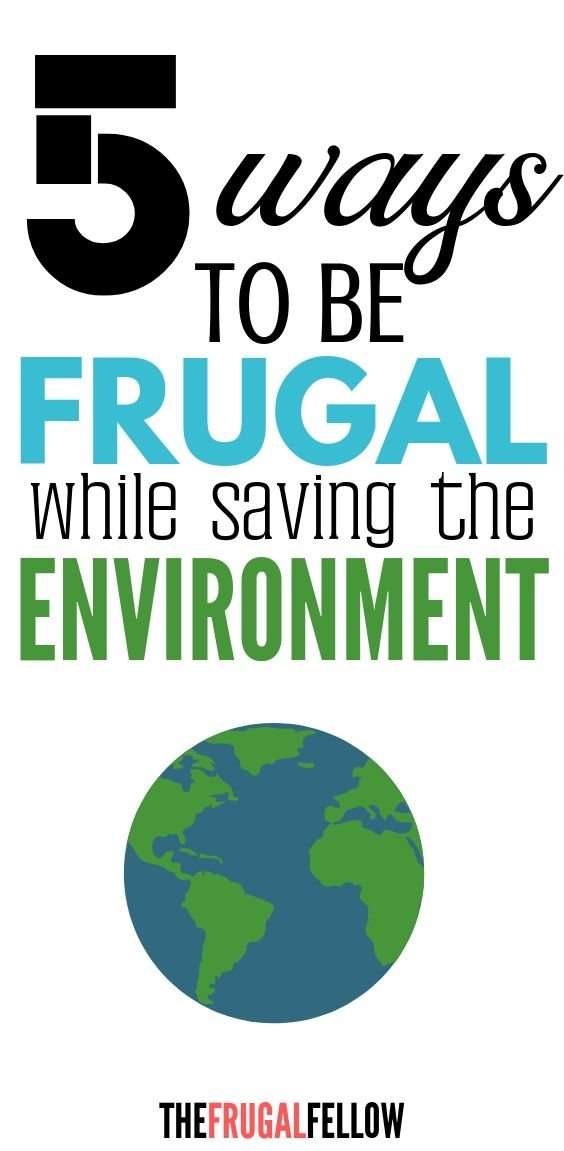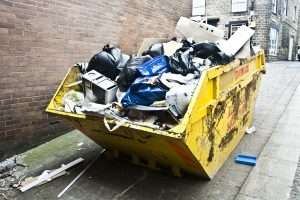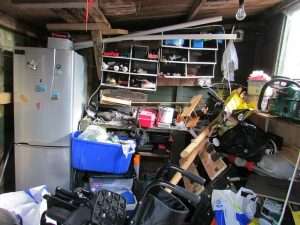Contents
ToggleRecently I read a post very similar to this one. I always try to be frugal and help the environment, so I was compelled to present some ideas of my own. At the same time, I know I need to be better about some of these things.
So, this is also a way to hold myself accountable in the areas in which I am slacking.
It’s really quite interesting because the more you think about it, the more you realize that these two ideas are more compatible than you may realize.
So, what do you do to be frugal?

1. Bring Your Lunch Instead of Buying It
Remember how I said I need to get better about a lot of these? Well, bringing my lunch is what I would call exhibit A. Indeed, there are a lot of days when I feel like I should have brought my lunch, but I simply didn’t have the motivation.
Here’s the thing, though: buying my lunch means using more single-use, disposable items. If I buy my lunch, both the containers I use as well as my utensils will end up in the trash.
That’s a big deal since according to the Earth Day Network, takeout orders account for around 269,000 US tons of plastic waste that have entered the oceans.
And look – I get it. Many of us don’t think about these things because they don’t affect our daily lives.
Well, at some point they will affect our daily lives more based on current trends, but still. Even if you just don’t care about the growing amount of single-use disposables in our landfills and our oceans, we all know that bringing your lunch to work will be cheaper than buying it.
What better way to be frugal than buying your own lunch?
2. Be Frugal by Ditching Bottled Water
Yes, it is true that tap water can be compromised in some cases. One such case is local to my area, where Chemours has provided bottled water to families whose water supplies are potentially tainted by a chemical called GenX.
More recently Chemours has pushed water filters as a solution, but I can understand why people would want bottled water in this situation.
And those folks aren’t alone. The most recent EPA data I could find shows that 91.4 percent of water systems in the US meet all applicable health-based drinking water standards. 91.4 percent is pretty good, but that leaves a very rough 28 million people whose water system doesn’t meet federal guidelines.
It would be nearly impossible to figure out how many people are actually serviced by each one of these systems that don’t meet federal guidelines. So I did the next best thing and multiplied the population of the US by the remaining 8.6 percent.
Similarly, bottled and canned soda creates unnecessary waste in addition to being expensive. Sure, buying a 24-pack of soda from Wal-Mart is relatively cheap, but hitting up the vending machine certainly isn’t.
As an alternative, I picked up a Drinkmate several months back and I must say – I love this thing! It helps me cut back on waste, cut back on actual soda, and best of all, it’s cheaper in the long run.
In addition to ditching bottled water, it’s always a good idea to reduce water usage in general.
Growler Refill at Whole Foods
As an add-on to ditching bottled water, I recently discovered the Whole Foods closest to me has several beers on tap for growler refills. This is an easy way to eliminate yet another disposable container.
And Whole Foods isn’t the only place that does this. There are several bottle shops in my area that refill growlers, so check your local options.
Technically this isn’t exactly “frugal” since beer is an added expense, but it’s still a nice way to cut back on waste.

Also, yes, beer bottles and cans are usually recyclable, but reusing always beats recycling. You should always try to reuse before recycling.
The main downside to using a growler is that beer may go flat after about 36 hours once opened. So, as with most reusable solutions, this one does require you to be a bit more deliberate.
You Have Options
All that said, even the aforementioned people have options. Even for them, bottled water is not automatically the one and only solution. In an interview with NPR, Elizabeth Royte mentioned that a good place to start in your approach is your right-to-know report or consumer-confidence report.
These reports are required if you’re part of a community water system, and they will tell you what is in your water supply.
Once you know what is in your water supply, you can determine whether different types of filters would remove all potential contaminants. If something basic such as a Brita pitcher won’t get the job done, Royte mentioned reverse osmosis filters. These filters remove “nearly everything,” she says.
While these filters aren’t cheap, they can last an extremely long time – 10 to 15 years with regular maintenance, says Water Tech. That solution is quite obviously much cheaper in the long run than bottled water – not to mention creation far less pollution.
I realize this is a complicated situation, to say the least. Still, we shouldn’t assume that bottled water is the best or the only solution because that simply isn’t true. Do your research and you may find you have other options.
3. Use Public Transportation to Be Frugal
I realize this is not an option for everyone. If you have it though, you should take advantage. Many commuter trains run on electricity, which is far more efficient than gas. Even the ones that aren’t electric are typically diesel-powered – still more efficient than gas.
It’s no secret that I like prefer electric forms of transportation over those that pollute the atmosphere. Yes, I have seen some debate over how much “better” electricity really is given that power plants burn coal and other pollutants in many cases. But I find these arguments counter-productive.



Electric trains are the most efficient means of transportation. Conversely, gasoline-powered cars are very inefficient. In addition, it’s much easier to regulate a few power plants than it is to regulate millions of vehicles.
Thus, if we only have to regulate the pollution being done by the power plants, it’s much easier to control what enters the atmosphere.
And even if you ride a diesel-powered train or bus, the footprint is still much better. After all, diesel is already better than gas. Plus, you are “carpooling” in that scenario.
By that I mean having only one vehicle for several passengers. Reducing the number of vehicles on the road will almost always create less pollution.
Oh, and I haven’t even mentioned the cost. In the interest of the theme of this post, I’d be remiss if I didn’t do so. Luckily, ThoughtCo. has already done that for me.
Spoiler alert: yes, public transit is probably cheaper than driving. So indeed, it’s a great way to be frugal.
4. Frugal Living Tip: Buy in Bulk
This is a great frugal living tip. While I do not have a Costco membership myself, many people in the FI community do. And they swear by it.
It may not make sense to have a membership if you are single or have a small family. For larger families, it might be worth considering.
I would guess that most of us are familiar with the idea of buying in bulk. You pay more up front but pay less per unit, making it cheaper in the long run.
At the same time, although the profit margin is smaller per item, it still works as a business model since you are committing to buying more of them.
This is basically the same business model that makes Walmart so successful. They just sell more items in smaller quantities, but at a low cost with slim profit margins. What can we say – we like low prices.
Coming back to the idea of buying bulk: yes, the cost is lower in the long run. What we don’t often talk about, though, is the packaging. Consider toilet paper, for example. The reduction in waste may not be huge. But when you consider having to package four rolls compared to packaging 30 of them, you will inevitably use more plastic on seven or eight packs of four.
These small differences can really add up over time.
5. Switch to Shampoo Bars (in Bulk if Possible!)
This is a change I have not yet done myself, but I will in the near future. If you aren’t familiar with shampoo bars
Needless to say, this one lines up with the overall message here. Not only can buying shampoo bars in bulk be cheaper than buying shampoo bottles, but they are often packaged in paper.
That means you eliminate a lot of the plastic you would normally be getting with shampoo bottles.
I haven’t checked my local options yet, but if you can buy them locally at a reasonable price, that also helps. Doing so means you are cutting down on packing materials, which yet again reduces waste.
Lastly, and this is just a bonus frugal living tip: I’ve read that if you use shampoo bars, you should get a well-drained soap dish.
The reason for that is because if they sit in water, it speeds up the dissolving process. Getting a soap dish allows you to prevent wasting it.
Frugal Living Tips the Environment Will Thanks Us For
The environment is a complicated thing. Very complicated. Typically when we are done using things, we shove them in a corner of the world where they aren’t visible. Because they are sort of hidden, we won’t necessarily notice the effects of reducing waste immediately.



We won’t necessarily notice the effects of more pollution, either. But that isn’t an excuse. Plastic, styrofoam, and other packaging take many years to break down. Some of it is recycled, but most of it isn’t. And the reality is that reducing is generally a much more effective strategy than reusing.
No, I’m not saying we shouldn’t recycle. We should do that, too. But we should reduce first, and recycle what’s left.
Besides, our wallets will thank us – not just the environment. Even if the environment isn’t important to you, there are lots of ways you can save money with these small steps. And if saving money isn’t important to you, well, you’re in the wrong place.











These are all great tips! You could also buy bulk foods and even items like soap or shampoo from the bulk sections of grocery stores. I watch for sales, bring my own bags or containers for liquid items, and stock up!
Ahh, excellent point. I need to investigate that around here.
Great post! Buying the water on the big containers you fill on the supermarkets could also be an option. And for bringing your lunch to work, you could also meal plan and do one day of cooking for the week. Saving not only time but electricity/gas as well. Small little changes that can make a difference in the long run.
Very good list here. I bring my lunch to work many days, but I am bad act actually bringing my own silverware, so I end up using a lot of plastic forks in the process. Today I remembered to bring my own fork from home, but I needed to be better about that. I’ve never heard about the shampoo bars; will have to definitely check those out!
Excellent tips. Bringing lunch to work is a great way to save money and the environment. My husband takes a lunch to work every day because if he doesn’t then he can’t eat, but even if buying a lunch was an option, we would still go with a packed lunch. We always make a bit extra at dinner so he can have a hot homemade lunch the next day. I want to switch to shampoo bars soon, but first working on using up what regular shampoo we have in the house.
Love this list!! Shampoo bars are on my to-dos as well. Packing your own lunch is soooooo great. And it doesn’t have to be fancy. A PBJ and an apple works just fine, and uses 1 container. You don’t even really have to wash it except week to week (unless you’re crazy with the jam volumes). So excited sustainability is being talked about more in the FI space. Typically, the most environmentally friendly thing is also the thing which saves you the most money! Win win.
Good ideas! And yeah, sustainability and such is something that has kind of always been in the back of my mind, but I’ve become more aware of it recently. 🙂
I need to give shampoo bars another go. My first attempt was an absolute failure but I bet there’s another kind that will work better for my hair. In the meantime I’ve been compromising with bulk bottles from Costco so they are at least LESS wasteful by virtue of size.
I haven’t even tried it yet. Oops. But I read a lot online suggesting they are a viable substitute. Hopefully I can find one as well!
I like the Shampoo bars idea. Great for traveling, too
The bottled water one is where I have trouble! You’ve motivated me to find alternate ways to get a good clean drink!
Thanks!
That’s great Karen. I’m so glad to hear this is making an impact!
I do some of these, but I’ve never tried shampoo bars, so it’s now on my list of things to buy for my next trip!
Nice post! My office provides lunch (on dishes) with a compost bin / recycle bin for leftovers and glass bottles so no cost/minimal waste there.
Interestingly, there was a boil water advisory here in Austin the past week due to heavy rains/flooding, and there was a massive run on bottled water. All people had to do was plan a little ahead and boil water for 3-4 minutes. So crazy.
Wow, that is awesome that your office does that! And I heard about the water situation because we have two consultants here in NC and strangely, both of them live in Austin. That really is crazy, though I’m honestly not surprised – people can be very paranoid about that stuff. Kind of sad, but true.
This is a great list! Bringing lunch to work probably saves me hundreds of dollars every year. If I may, i would also add using reusable k-cup pods. Buying one set and then using regular ground coffee saves a ton of money and is so much better for the environment than disposable pods!
It must have totally slipped my mind to add this. I have done so, and that’s a great trick as well. I’m going to add it though – thanks!